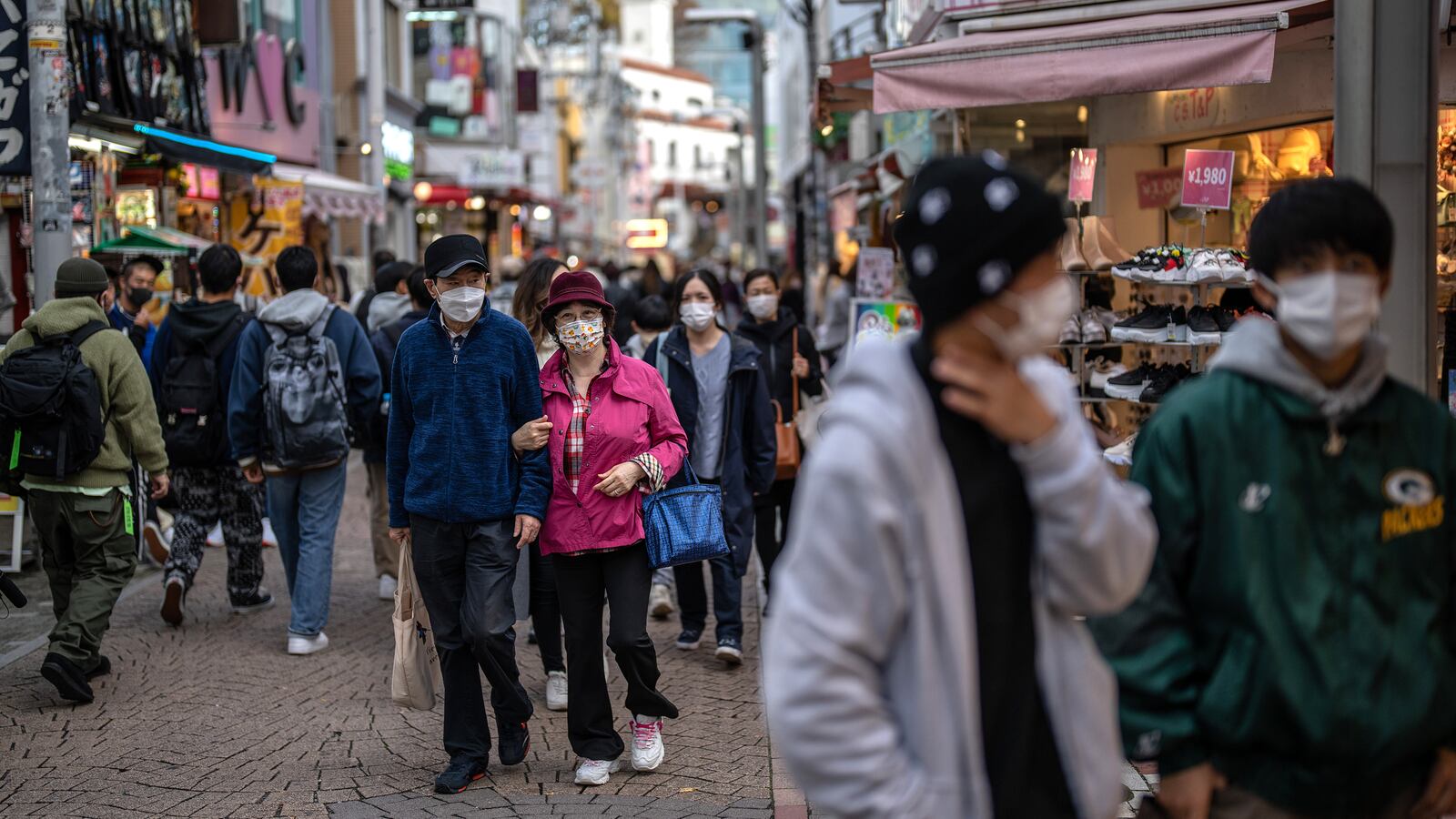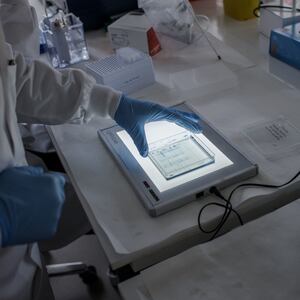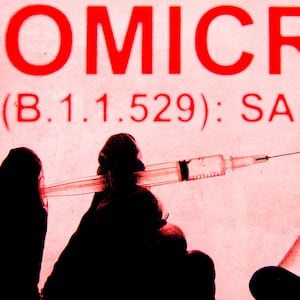COVID cases are on the rise all over the world. The onset of winter in the northern hemisphere, the rapid spread of the new and more transmissible Omicron variant, and the stubbornness of the previous variant, Delta, have all contributed to a surge in infections, hospitalizations, and deaths in many countries.
But not in Japan. In Japan, COVID has all but disappeared. And it’s mostly clear why.
“It always comes down to vaccines, to social restrictions [on] large gatherings, mask-wearing,” Dale Fisher, group chief of medicine at Singapore’s National University Health System, told The Daily Beast. “There’s no secret code that any country has discovered.”
While many countries including the United States struggle against a stubborn minority of fervent anti-vaxxers, Japan has quietly vaccinated 80 percent of its 126 million people. That’s nearly everyone who’s over 5 years old and thus eligible.
In a lot of countries, mask mandates are deeply controversial. But not in Japan, where many people habitually wore masks in public even before the pandemic.
When SARS-CoV-2 first came to Japan, the country suffered like every other country did, scrambling to contain the virus through a combination of business and school closures, mask mandates, contact-tracing, quarantines, and travel bans.
More than 18,000 Japanese have died. That’s 14 out of every 100,000 people in the country, compared to 127 out of 100,000 in Germany and a staggering 242 out of 100,000 in the U.S.
Once vaccines were widely available starting this spring, however, Japan showed the world that it’s special, if not quite unique. There are a few other countries that are as highly vaxxed as Japan is—Singapore and Israel, to name a couple. But even those two countries are registering a lot more new cases than Japan is right now. Last week, authorities in Tokyo reported just 113 new infections a day on average. Israeli officials reported 615 cases a day in a population of 9 million people. Singapore, with fewer than 6 million people, reported 645 a day.
The U.S., by the way, is back up to 120,000 new infections a day as COVID rips through the 40 percent of the population that has refused to get vaccinated or, in the case of kids under 5, isn’t eligible yet.
Japan is beating COVID primarily by steadily vaccinating everyone. Remarkably, it did so without really mandating jabs anywhere. “Vaccines will never be administered without the recipient’s consent,” Japanese Prime Minister Fumio Kishida vowed on his official website. “We urge the public never to coerce vaccinations at the workplace or upon others around them, and never to treat those who have not received the vaccine in a discriminatory manner.”
That lack of coercion didn’t seem to matter. It took just five months for almost all eligible Japanese to get jabbed.
That community-mindedness is equally apparent when it comes to masks, which experts stress are still key tools for preventing the virus’s spread even where good vaccines are free and readily available. When it comes to masks, in Japan “there’s just an acceptance,” Fisher explained. “It does reflect on the society.”
But even widespread vaxxing and masking don’t totally explain Japan’s success suppressing the virus, Taro Yamamoto, chairman of the Department of International Health at the Institute of Tropical Medicine at Nagasaki University, told The Daily Beast. “It’s not clear at this point what other factors are involved,” Yamamoto said.
The Japanese government has adopted sound COVID policies and the Japanese people, demonstrating what to Americans might seem like an unusual degree of trust in their leaders and each other, have gone right along. Plus, the country appears to just be… lucky. “I don’t believe Japan has a secret formula,” Fisher said.
If there’s a caveat, it’s that one of the most stringent policies—on-again, off-again bans on travel to Japan—isn’t really helping. Japan was all but inaccessible to non-resident foreigners for two years. Tokyo was just about to start relaxing the travel ban when Omicron first appeared. Now Japan remains closed to most outsiders.
But two years into a global pandemic, where the virus has already found its way into every region of every country, border-closings simply don’t work any more, Fisher said. “Travel restrictions are a false sense of security.”
Pointless travel ban aside, it looks like Japan is winning its war on COVID. But experts warn that could change. There are worrying signs that the new Omicron variant makes the standard, two-dose regimen of the messenger-RNA vaccines less effective.
A third shot—a booster—should help. But compared to other rich countries, Japan has been slow to offer boosters to the general population. The government authorized health-care workers to get boosted starting Dec. 1. That was an obvious first step, as health workers are at elevated risk—and since many workers in the health-care industry were first in line to get vaccinated and thus might, by now, be losing some of their vaccine-induced antibodies.
The government wants people to wait until eight months after their prime immunizations to get boosted, meaning everyday people who don’t work in health care aren’t yet eligible. After all, widespread vaccination didn’t get underway in Japan until early summer.
But Omicron won’t wait. Tokyo knows it needs to speed up booster eligibility, but hasn’t yet come up with a plan. “We are hoping to determine the effect of the existing vaccines on the Omicron strain as soon as possible, and then show the scope and method of moving up booster shots,” Kishida told legislators last week.
Even if the government immediately authorizes everyone to get boosted, Japan will still be behind many other countries as far as third shots are concerned. The U.S. for all its scattershot approach to COVID at least has moved quickly on boosters. The U.S. Food and Drug administration has authorized everyone 16 and older to get a third shot. A quarter of Americans are already boosted.
Japanese officials have tallied just a dozen or so Omicron cases in the country. But the variant may yet become dominant in Japan. And if Omicron takes over before large numbers of residents can get their boosters, the variant’s potential to evade prime vaccination could leave Japan vulnerable.
“We are just at the beginning of winter so it is quite possible that they will see a surge in January [to] February,” Paul Ananth, president of the Asia Pacific Society of Clinical Microbiology and Infection in Singapore, told The Daily Beast.
As far as COVID is concerned, Japan has done almost everything right. But that could change as the pandemic enters its third year and Japan, as well as the rest of the world, tries to keep up with an evolving virus and achieve some form of population-level “herd” immunity, where viral transmission is all but impossible.
“SARS-COV2 mutates quickly, and like the flu, there will always be viruses that escape immunity,” Yamamoto said. “The acquisition of herd immunity will be established after immunity to some mutant strains has been acquired. It will take a year or two.”
A year or two is plenty of time for something to go wrong.







